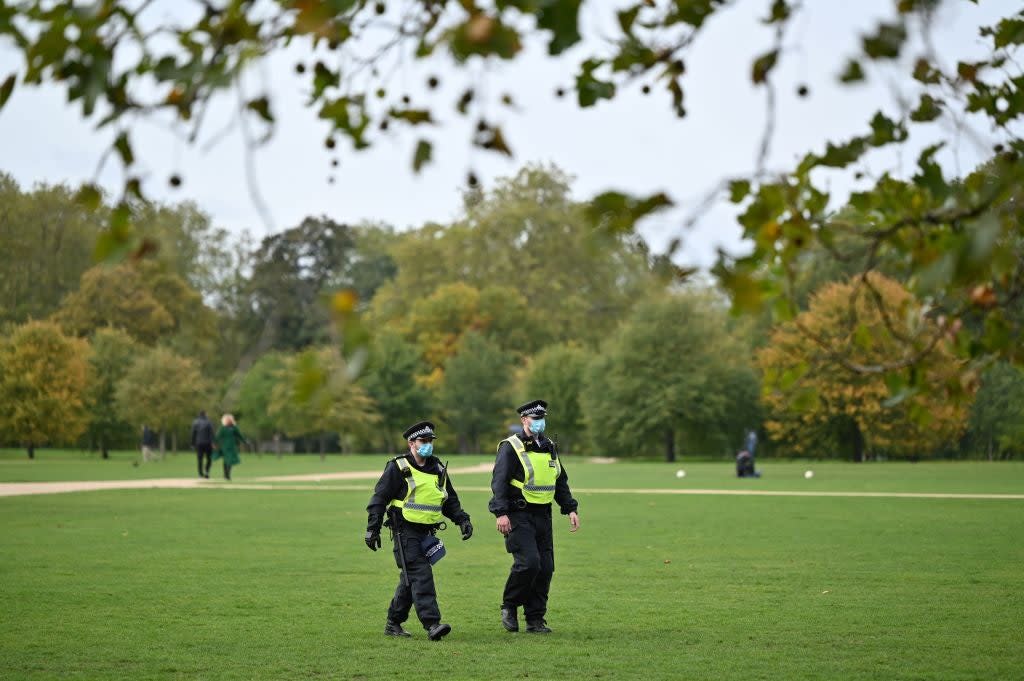You may not like Covid restrictions, but those upholding the law deserve your respect

Police wear face masks as they patrol a park
(AFP via Getty Images)When we look back on the coronavirus pandemic in years to come, most of us will feel an overwhelming sense of gratitude to the many key workers who have so selflessly kept us safe through the crisis.
But sadly, this appreciation is not shared by all.
Shocking statistics released by the Crown Prosecution Service (CPS) this week revealed around a quarter of coronavirus-related crimes prosecuted in the first six months of the pandemic were assaults on emergency workers.
Police officers, in particular, have borne the brunt of this, with many coughed and spat on – as well as being kicked and punched – when stopping suspected lockdown rule breakers.
There have also been cases of healthcare workers attacked when called upon to treat aggressors.
This is totally unacceptable, and I will do everything in my power to protect our emergency workers.
But while carers, police and other public servants rightly receive our thanks, behind the scenes lawyers have been playing an essential role in maintaining our criminal justice system during a health emergency.
Throughout the pandemic, dedicated CPS staff have carried on protecting the public, dealing with high-priority cases including terrorism, murder and rape.
But it is not just in our regular casework where we have played our part.
The CPS, like many other organisations across the country, has had to adapt quickly to a raft of new laws and regulations brought in to ensure public compliance with lockdown measures.
The police are responsible for enforcing these rules on the streets. But where individuals have not paid their fines or admitted an offence under the Health Protection Regulations, the CPS must decide if further action should be taken.
As with any case, the test we apply to alleged lockdown breaches is whether there is enough evidence to bring charges and if it is in the public interest to do so.
The public should be reassured we are not prosecuting people for resting on a park bench or taking legitimate exercise.
Most of the more than 1,000 cases we have reviewed involved people committing other crimes when they should have been at home, or serious breaches of the rules.
Cases where it was right to prosecute include offenders repeatedly seen out without a reasonable excuse and refusing to go home when instructed by police, gatherings of people from different households and individuals failing to self-isolate when required by law.
These are serious charges brought under laws intended to stop the spread of a potentially fatal virus around the country.
In a fast-moving situation, however, it is right there are protections in place to stop people being wrongly criminalised and CPS lawyers are playing an indispensable role in ensuring the right person is charged with the right offence.
In some cases, we have stopped prosecutions where we found the law has been wrongly or unnecessarily applied.
Of course, all of us in the criminal justice system are looking forward to the day restrictions on social mixing are lifted and it is no longer necessary to prosecute these offences.
But even when all the vaccines are administered, we will be living with the consequences of Covid-19 for some time in the backlog of criminal cases the crisis has generated.
As of October, we had around 180,000 live cases in our system – a 76 per cent increase on our pre-pandemic baseline.
While progress is being made in clearing the magistrates’ court backlog, a continuous effort is needed to tackle the Crown Court bottleneck – particularly in cases with high victim dropout rates such as rape and domestic abuse.
Technology has an essential role to play and the crisis has shown the CPS has the capability to prosecute from anywhere.
The pandemic has fast-tracked digital reform in the courts and shown its potential. As we look to the future, a mixed model of video and physical attendance at court will be vital to reduce the backlog and deal with the inevitable delays caused due to Covid-19.
While we carry out our constantly evolving jobs, coronavirus-related crimes against those who are protecting the British public will not be tolerated.
Max Hill QC, director of Public Prosecutions, Crown Prosecution Service
Read More
Police break up wedding with 400 guests in East London
Officer injured and woman fined £10,000 after police shut down party
How much can people be fined for breaking lockdown rules?
Covid rule-breakers increasingly likely to be fined, police chief says

 Yahoo Movies
Yahoo Movies 
